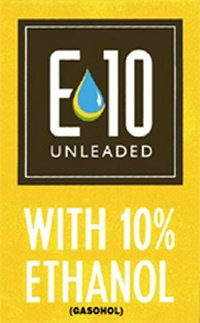|
E10
on sale in the UK in 2013?
The Federation
of British Historic Vehicle Clubs exists to uphold the freedom
to use old vehicles on the road. It does this by representing
the interests of owners of such vehicles to politicians, government
officials, and legislators both in UK and through membership
of Fédération Internationale des Véhicules
Anciens (FIVA) in Europe.
Note: E10 label alongside is from the US.
Posted: 121216
Back to homepage
|
 |
Matthew
Vincent (FBHVC) reports the legislative process
to permit the introduction of petrol containing
up to 10% ethanol is expected to be completed by
very late 2012 or early 2013. Once the enabling
legislation is in place, the product, which will
bear the name E10, may be sold at petrol stations,
but unlike petrol containing 5% ethanol, which is
already on sale, and which carries no label, E10
must be labelled.
There has been recent publicity suggesting that
there will be no introduction of the E10 petrol
until 2014 or 2015. This may prove to be the case,
and it would be the situation which naturally the
Federation would welcome. |
|
However,
once the law permits the sale of this product,
it must be recognised that it may appear in the
market place. There may be retailers who wish
to sell this fuel sooner rather than later. The
Federation has been keen to ensure that when E10
petrol does appear at the pumps, it can be easily
recognised for what it is, enabling the historic
vehicle owner to make an informed choice over
whether or not to purchase the product.
The
higher octane petrol blend usually known as Super
Premium contains much reduced levels of ethanol
as a general rule, so this may be worth considering
for those owners of historic vehicles who are
concerned about possible adverse effects from
the addition of ethanol to normal 95 octane unleaded
petrol. Oil industry sources indicate that the
Super Premium product, which must by law provide
an octane quality of 97, but which may in fact
exceed 99 octane, is blended to meet these quality
levels without the addition of ethanol. In many
cases no ethanol is blended into this product
after it is transported from the refinery, although
this is not always the case, making it very difficult
to be precise about the ethanol content in Super
Premium grade fuel. Oil company producers do not
always have close control over distribution terminals
which is where ethanol is blended into petrol
before sale at garage forecourts. However, on
balance, purchasing a Super Premium blend of unleaded
petrol provides the opportunity to minimise ethanol
content.
|
|
|

